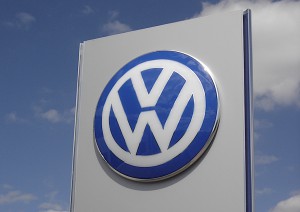
Volkswagen as well as BMW and Daimler colluded to limit use of improved emissions technology in their European vehicles, an EU investigation found.
After completing its investigation, it was determined that collusion did occur … between Volkswagen, BMW and Daimler AG, European Union investigators said in a preliminary report.
EU authorities declared the three German automakers colluded to limit the development of emissions-cleaning technology in their vehicles, violating EU laws between 2006 and 2014. The union’s antitrust regulator, according to Associated Press, recently completed an investigation into the actions of the three companies.
It determined that the three automakers agreed to limit the use of exhaust-improving technologies for gasoline- and diesel-powered vehicles. The result limited the access of Europeans to less polluting cars, but not the price.
“Daimler, VW and BMW may have broken EU competition rules. As a result, European consumers may have been denied the opportunity to buy cars with the best available technology,” European Competition Commissioner Margrethe Vestager said in a statement.
(SEC suing VW, former CEO, for “massive fraud” in emissions cheating scandal. Click Here for the story.)
EU authorities began their investigation of the three automakers last September, after raids of the offices of the three companies in October 2017 provided enough evidence to move forward. At the time, Daimler, Volkswagen and BMW all said they were cooperating with the EU Commission, AP noted.
EU authorities began their investigation of the three automakers last September, after raids of the offices of the three companies in October 2017 provided enough evidence to move forward. At the time, Daimler, Volkswagen and BMW all said they were cooperating with the EU Commission, AP noted.
The investigation’s focus was on selective catalytic reduction systems to reduce harmful nitrogen oxides emissions of diesel passenger cars through the injection of urea, which is also called AdBlue, in the exhaust gas stream, Reuters reported.
(Click Here to see more about German automakers placing a big bet on electric vehicles.)
It is also concerned about potential collusion on “Otto” particle filters to reduce harmful particle emissions from exhaust gases of gasoline-powered passenger cars.
The probe is separate from other legal procedures against carmakers for allegedly breaching environmental laws, AP reported. Officials said the preliminary findings do not prejudge the final outcome of the investigation.
(To see more about American views on electric vehicles and the future, Click Here.)

I would be shocked if they didn’t.
Seems like this would be difficult to prove, short of memoes crossing companies with discussion on when and how many. Application to a vehicle is constrained by readiness of the technology (Bosch, Contintental, other Tier I suppliers) and timing of new vehicle and/or engine platforms to attach them to. Those things have to align and then the cost has to be factored in.